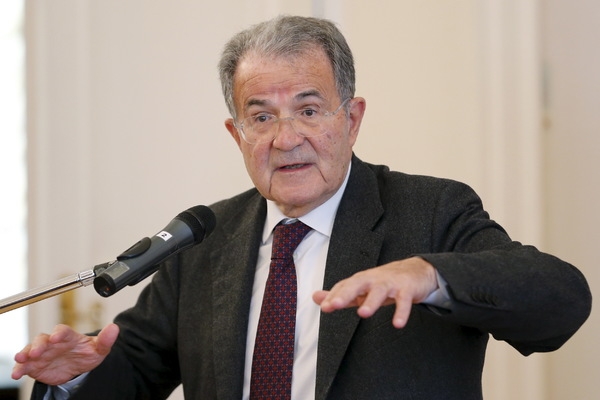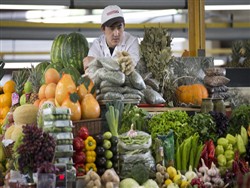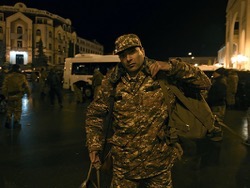“Isolation of Russia is absolutely not necessary”
Romano Prodi
Photo: Maxim Zmeyev / Reuters
Economic hardship, migration crisis, the possibility of detaching the UK — recently, the EU was confronted with many domestic problems to solve that have not yet been obtained. Enough and external challenges, one of which was the new format of relations with Russia. All this “Tape.Roo” spoke with the former President of the European Commission Romano Prodi.
“Ribbon.ru”: You resigned as President of the European Commission more than ten years ago. As since then has changed the European Union?
For ten years the European Union has changed radically. We have entered a turbulent period, the period of crises. For example, during my presidency, we led discussions about expansion, about the project of a common Constitution, and then — towards the end of my term in France and Denmark this project has vetoed in the history of the EU began a de facto new period, when the power of the European Commission has weakened considerably and the main role is now played by individual States. Now the decision-making center in Europe — the European Council, in which leaders are found outside the EU States.
There are other changes. We used to have a lot of power centers: Germany, France, UK, Spain and partly Italy. For ten years the situation became different: due to objective reasons, Germany has increased dramatically compared to other States. France has been weakened of its difficult political situation, and the UK decided to hold a referendum, putting its future in the EU into question. Therefore, the majority of European States decided to stand under the only remaining “umbrella” — German. Fuel to the fire of instability was added by the economic crisis and the problem of migrants.
You said that Germany has considerably strengthened its influence. Now more and more say that she became the de facto leader of the European Union, and all significant decisions are taken in Berlin. If this does not undermine the centralization of the democratic principles on which the EU was founded?
I think there is no undermining of the fundamental principles, because Germany is a democratic country. But I agree — the very essence of the mechanism of decision-making within the Union has changed. Because of this situation Germany has more responsibility, since it must take into account the interests of all members of the European Union. It’s not always easy, and achieving consensus is more difficult now.
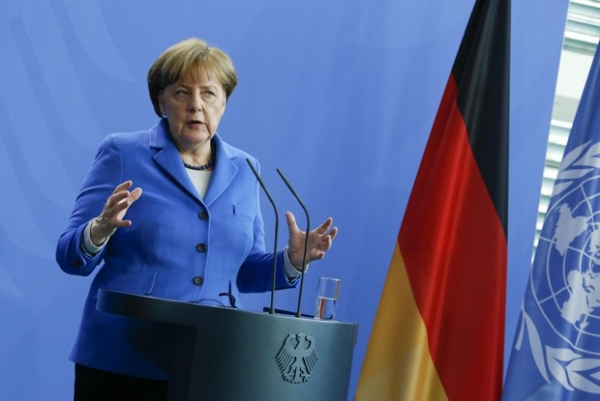
The Chancellor Angela Merkel is considered the informal head of the European Union
Photo: Fabrizio Bensch / Reuters
Take economic policy: Berlin has their priorities — stability, economy, control of inflation and public debt. Some countries on the periphery of the EU with such approach do not agree, they say: “If we are not going to spend money and grow, we will not solve our social problems”. Yes, being a leading country, it is difficult to remain above the fray, to be a kind of mediator, but nothing anti-democratic in this — Germany has increased solely due to their achievements.
Of course, to reach consensus more difficult, but if it’s excessive enlargement of the EU? There is widespread perception that the most stable European Union was within the boundaries of Charlemagne’s Empire. Sometimes it seems that the EU authorities aim to enable the Union of the largest possible number of countries. Isn’t it better to have a more compact, but internally a more stable Union?
Actually you cannot change the natural course of history. People had a desire to become part of the United Europe, to join this historic process. Yes, if you have six countries, it is easier to reach a compromise, but to be honest: when I assumed the position of President of the European Commission, the EU had fifteen countries. At the time I left there were already twenty-five and didn’t make any difference, the order of operation has not changed.
While the common vision of a United Europe, all right. Now the British referendum has become for us a kind of test, but again: the problem is not the number of countries and in different understanding of the prospects of the European Union. Despite all the difficulties, Europe is still very strong.
The European Union is not going to abandon the policy of sanctions against Russia. Someone thinks that the reason — in influence of Washington, someone believes that in the formulation of European policy, much attention is paid to moral values and beliefs. What do you think here paramount?
The decision to impose sanctions was adopted by the Europeans, and the American position has played only a minor role. Now we need to change the thinking within the EU and began to establish relations with Russia. Here the first violin will play Germany — in view of its significant influence on the development of pan-European solutions.
At the moment the countries of Europe belong to Russia in different ways: someone wants the immediate lifting of sanctions, someone considers them to be eternal. I hope we all understand that the policy of sanctions is a road to nowhere, their need to cancel. Isolation of Russia is absolutely not necessary, especially now that she has regained the leading position in the global political arena. Moscow and Brussels need to cooperate fully is it important in long-term historical perspective.
You talked about the fact that Russia and the European Union should accept each other for who they are. But where to start? Should Brussels in the framework of such “acceptance” to recognize Crimea as part of Russia?
After such a major split is difficult to begin to compromise on important issues, to do some formal recognition. Europe should stop demonizing Russia’s policy, and Moscow is not seeking to undermine the unity of the EU.
You can start with small initiatives: why don’t we implement joint humanitarian projects on the territory of Ukraine? Still, for example, it is possible to establish cooperation between European and Eurasian economic Union, to demonstrate the compatibility of these organizations.
I think after a period of such troubled relationships to cooperate, but start small — with those questions which affect the interests of both sides: a lot of them. It is clear that none of the parties will not go towards another just to do the nice — each has its own interests, it is quite natural. But the problem of Ukraine, for example, objectively harmful to our common interests, and because you need to show desire and imagination, and finally to solve it.
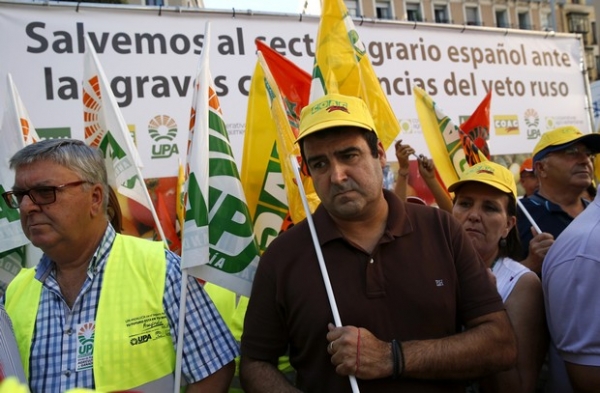
The decision of the Russian authorities to stop buying European food in response to sanctions has caused the dissatisfaction of many farmers from member countries of the EU
Photo: Andrea Comas / Reuters
Recently we hosted a meeting of foreign Ministers, on which were formulated the principles of the relationship of the EU with Russia. The first principle is the implementation of the Minsk agreements. Should finally finish this still running, though frozen war. The second principle is to strengthen the partnership with our neighbours in Europe — in particular, I think this is a good chance to establish cooperation between the EU and the EEU. The third principle — strengthen the internal stability of the European Union.
However, the most interesting seems to me the principle of selective engagement (“selective interaction”) when there is an active work in specific areas, oriented on the result. This is the gateway that you want to open a little wider, to agree including on matters of foreign policy, to break the deadlock.
Finally, the Ministers stressed the need to develop contacts between people. My personal experience: in Italy, now in my language, there should be more, including in our universities. In any case, the restoration of relations between Russia and the European Union is not only possible, but necessary.
“Ribbon.ru” expresses gratitude to the club “Valdai” for assistance in arranging interviews.
